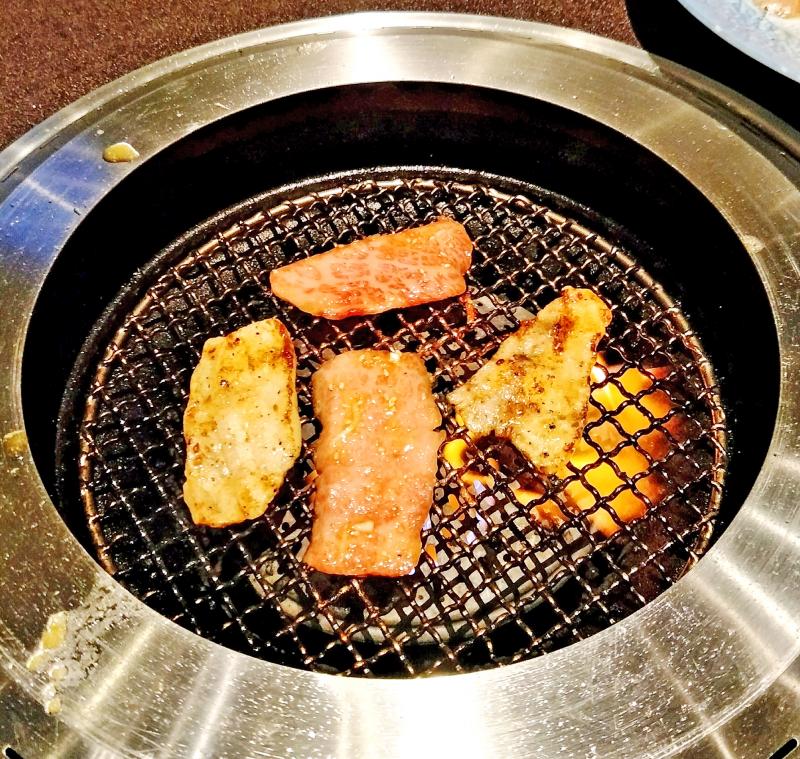People should try to adopt indoor alternatives to grilling outdoors over the Mid-Autumn Festival holiday, the Taiwan Social Responsibility and Welfare Research and Development Association has said.
Barbecues are popular on the Mid-Autumn Festival, which is Tuesday next week.
Given the COVID-19 situation, a number of local governments last week announced a ban on barbecues in public areas during the holiday, but the association issued the call primarily over health concerns.

Photo: Tsai Chang-sheng, Taipei Times
Animal fat dripping onto coals or heating rods releases harmful substances, such as smoke, carbon black motes, carbon monoxide and polycyclic aromatic hydrocarbons (PAHs), said Liu Tsung-jung (劉宗榮), association member and honorary professor at Yang Ming University.
When grilled, meat undergoes a chemical change and secretes heterocyclic amines (HCA), which are carcinogenic and could lead to colorectal cancer, he added.
Grilling releases substances in meat that harm humans through exposure, smell and consumption, said Wei Kuo-yen (魏國彥), association member and a former minister of the Environmental Protection Administration.
Skin exposure is typically the most frequently overlooked effect, he said, adding that harmful substances could be absorbed through the skin if not immediately washed off.
The smoke from grilling meat has been proven to harm the skin’s antioxidative properties, causing it to age faster, he said.
If grilling meat cannot be avoided, people should lower the grill’s temperature and turn the meat more frequently to prevent charring, Liu said.
Charcoal typically burns at 300°C to 500°C, but grilling meat begins generating HCAs at 120°C, Liu said, adding that the amount of HCA generated is a direct correlation of the grilling meat’s temperature.
The generation of PAHs can be greatly reduced by frequently turning over the meat over low heat or wrapping in aluminum foil before placing it on the grill, Liu said.
Grilling vegetables and meat simultaneously can reduce the temperature of the meat, Liu added.

The Coast Guard Administration (CGA) yesterday said it had deployed patrol vessels to expel a China Coast Guard ship and a Chinese fishing boat near Pratas Island (Dongsha Island, 東沙群島) in the South China Sea. The China Coast Guard vessel was 28 nautical miles (52km) northeast of Pratas at 6:15am on Thursday, approaching the island’s restricted waters, which extend 24 nautical miles from its shoreline, the CGA’s Dongsha-Nansha Branch said in a statement. The Tainan, a 2,000-tonne cutter, was deployed by the CGA to shadow the Chinese ship, which left the area at 2:39pm on Friday, the statement said. At 6:31pm on Friday,

The Chinese People’s Liberation Army Navy’s (PLAN) third aircraft carrier, the Fujian, would pose a steep challenge to Taiwan’s ability to defend itself against a full-scale invasion, a defense expert said yesterday. Institute of National Defense and Security Research analyst Chieh Chung (揭仲) made the comment hours after the PLAN confirmed the carrier recently passed through the Taiwan Strait to conduct “scientific research tests and training missions” in the South China Sea. China has two carriers in operation — the Liaoning and the Shandong — with the Fujian undergoing sea trials. Although the PLAN needs time to train the Fujian’s air wing and

The American Institute in Taiwan (AIT) put Taiwan in danger, Ma Ying-jeou Foundation director Hsiao Hsu-tsen (蕭旭岑) said yesterday, hours after the de facto US embassy said that Beijing had misinterpreted World War II-era documents to isolate Taiwan. The AIT’s comments harmed the Republic of China’s (ROC) national interests and contradicted a part of the “six assurances” stipulating that the US would not change its official position on Taiwan’s sovereignty, Hsiao said. The “six assurances,” which were given by then-US president Ronald Reagan to Taiwan in 1982, say that Washington would not set a date for ending arm sales to Taiwan, consult

A Taiwanese academic yesterday said that Chinese Ambassador to Denmark Wang Xuefeng (王雪峰) disrespected Denmark and Japan when he earlier this year allegedly asked Japan’s embassy to make Taiwan’s representatives leave an event in Copenhagen. The Danish-language Berlingske on Sunday reported the incident in an article with the headline “The emperor’s birthday ended in drama in Copenhagen: More conflict may be on the way between Denmark and China.” It said that on Feb. 26, the Japanese embassy in Denmark held an event for Japanese Emperor Naruhito’s birthday, with about 200 guests in attendance, including representatives from Taiwan. After addressing the Japanese hosts, Wang